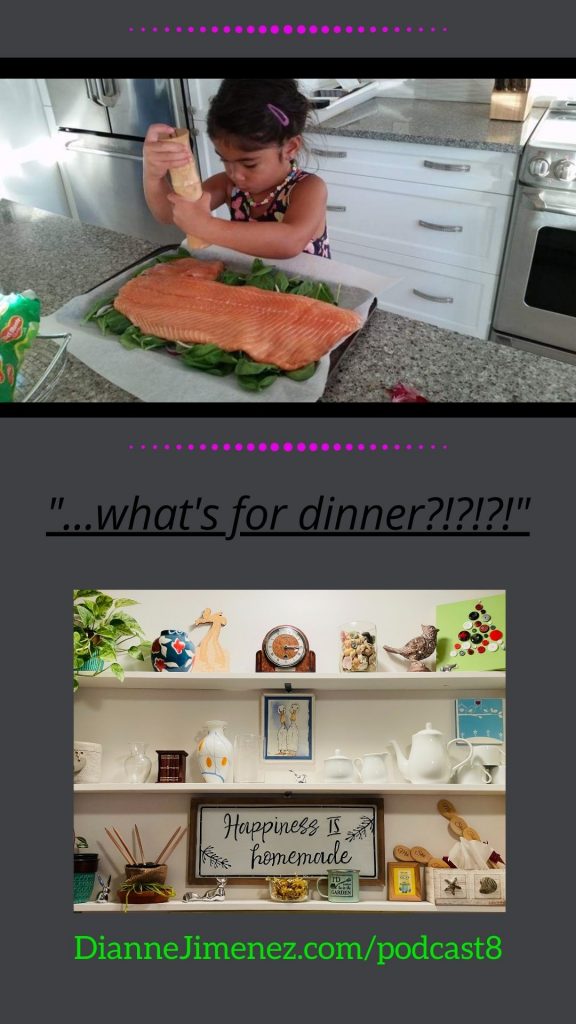Kitchen Organization Basics
EPISODE 8

by Dianne Jimenez
This article takes 9 minutes to read
Don’t have time to read this? Listen to the podcast episode instead:
Subscribe to the
PARENTING GUIDE: ORGANIZING MADE EASY PODCAST
and never miss a bonus episode!
Ahhhh! They often say the heart of the home is the kitchen. Do you agree?
It’s where we express so much joy or disgust – but mostly, and hopefully, the former among family, friends and where most conversations begin. It’s where the kids dump their bags and decompress from the day’s events and ask in unison: can I have a snack? Or they just quickly grab it themselves. It’s also where we spend some time scratching our heads and dreading that awful question – What’s for dinner?
I’m cringing now just saying it.
So in today’s episode it’s all about Kitchen Organization that makes sense for your family.
Typically, when I go to a client’s home or when I have casual conversation with friends, I always ask:
1)who’s main chef
I was organizing a client’s kitchen once. This was the second space that I worked on with her but THIS time, we had a 3rd party with us. Her husband.
Why?
Because 1) she wanted to get him involved so that he too can be on the same page as her when it came to organizing and contributing to maintaining the house.
Side note: did you know that organizing is like therapy? This is a GOOD thing. Not only is it helping you personally and developing new habits or finding more clarity… but it also helps to sometimes reset or even open the conversation, on a neutral ground with your spouse or partner, because there’s a neutral person there to “mediate” the conversation.
In NO way am I stating that organizers are therapists- maybe some of us are, it’s possible. But in this particular situation, it was interesting to be the guide for their conversation. You literally felt the air lift and the harmony set it. It was beautiful to experience!
Want to go from 'drowning' to peace of mind?
Anyway, when organizing a space and in particular, a kitchen – it’s important to determine the roles of each player. In this case, the husband – we’ll call him ‘Frank’ – was the head chef, aka does most of the cooking. So it’s key to have the main person in the room or WITH you when organizing.
Frank worked differently than his wife – we’ll call her ‘Susan’. And she didn’t know that. Or, I gather, they never really had a conversation about it. So my questions were directed more towards Frank like:
When you’re cooking, what typical spices or oils do you use? Where does the prep happen?
So working with Frank and seeing how he naturally moves in the kitchen – we simulated his movements here, he didn’t actually whip something up for us! But even the placement of the baking sheets and cookware were specific.
Susan on the other hand was more of the baker. So she had her input too about where specific baking items and bakeware needed to be.
I also asked them about frequency. This was key in the placement of their items and ingredients.
Which brings me to point #2 of kitchen organization:
- The ZONES
In the kitchen, there are a few key zones and I mentioned one before: prep and cooking. Then there’s the obvious one: washing. Now, when it comes to organizing, the key is to separate these zones as much as possible. I know, you might be saying
“I have a TINY kitchen!”
find out how families with 3+ kids tackle the beast: laundry!
Luckily for you – these zones are already outlined for you! Cooking: is by the oven, washing is by the sink. The prep station though… THAT’s where it can get tricky especially when you have a tiny kitchen OR no counter space. But as long as the space you choose for it has the items you need for prep – which are usually a cutting board, knives, some mixing bowls and spices not too far off. You’re pretty much set.
Now, IDEALLY the prep station would be closer to the cooking station but not necessarily right next to it. But you work with what you have. Growing up, when we had many helpers, our prep station was the dining room table!
Depending on the size of your kitchen and the different substations you have, organizing it so that you have what you need close to where you’re working or performing the action: like making coffee or sifting through recipes from your vast array of cook books.
The goal is so that you can move fluidly in the space and get what you need to get done in a timely manner.
So Frank’s very lucky family gets to enjoy his amazing sushi recipes and he’s particular about where his sushi and knife sets are located. In their specific situation, the knives – although most of them are in the drawers, these special ones were tucked neatly away in the lower cabinet near the cutting boards where the prep station normally takes place.
Also, this was the perfect spot to prep because then the kids have access to help out and be away from the cooking station.
How to get your kids started with laundry
Speaking of the kids, all of their typical needs: cereal, snacks bowls, were also away from the main cooking area. They truly could help themselves which meant more time for Frank and Susan, who are parents just like you, to focus on what needs to get done, right!?
So when it comes to organizing your kitchen, take note of where the main zones or stations are located, and establish where the substations are going to be. Ideally, they’re out of the way of the main zones for a smooth and not-so-cluttered feel in your kitchen!
And finally #3, you can’t organize the kitchen without looking into
- Maximizing Your Space
This is the heart of frustrations when it comes to home organizing; and kitchen organization – no less! Space is hard to come by IF we don’t respect it.
What do I mean?
Start thinking of your cabinets, your drawers, your counter space and shelves like prime real estate. This is where it’s AT, best of the best, baby! And some of the items you have are just that: best of the best!
Start thinking of your cabinets, your drawers, your counter space and shelves like prime real estate.
I’m going to give you some examples that we use here at home, of what I’ve seen in the industry and what I’ve suggested to my clients, friends and family:
Those pesky corners or too deep cabinets
Consider a lazy Susan. They sell them in various sizes with or without a border. That’s that ‘lip’ so the products can’t topple over. You get access to those hard to reach items way in the back just by giving that turn table a nice spin!
3 things to establish now before losing your s#!t later on
Also take advantage of the vertical space
set up a mini shelf inside your cabinets, there are tiered shelves they sell at Wal-Mart and even the dollar store. You can access your spices and bottles that are all the way in the back, without toppling those in the front!
Get rid of single use, gimmicky stuff.
IF your drawers are FILLEd with 1-hit wonders and you ONLY have a few drawers and very little cabinet space. Consider reducing the amount of items that only have 1 usage. Those awkward in shape like: banana containers, half and onion containers. Consider using regular food containers to hold these items. Square and rectangular shapes use up more of the drawer and cabinet spaces than round, or the ones that look like they’re square or rectangular? But they taper off at the bottom. They have a wide top and very narrow base.
If you’re not making good use of that prime real estate in your cabinets and drawers, so get rid of them!
Now speaking of square or rectangular shapes, you want to keep your life simple and easy by getting the same brand of food containers. Often they’re stackable and the lids can be stored together in a separate bin all in the same space!
Limit duplicates
How many spatulas, colanders or even frying pans do you really and truly need? Truly, be honest with yourself? Have a conversation with the main people who do the cooking and baking. Sometimes the frequency of use means the item can maybe be stored somewhere else, like where you store the BULK of your ingredients and/or large cook and bakeware.
Take my free training: "How to find time in a busy schedule" -
If you’re baking once or twice a year, it might be a good idea to start thinking about borrowing these large items and getting rid of, or selling the ones that you have, to maximize your space.
Storing pots and pans
Ah! Just like the food storage containers, you can organize them either Russian doll style and separate the pots from the lids. Or 1pot-1lid on shelves if you have the space for it. You see them in the magazines, Pinterest and even Ikea. You can include them as part of your kitchen décor by displaying them on the nearby shelves to save on drawer and cabinet space. The possibilities are endless!
So let’s to a recap of today’s episode: Kitchen Organization
- Organize with the person who does most of the cooking. If that’s you , great! If it isn’t, have the conversation and collaborate.
- Zones. Try to establish where the prep station is going to be since the cooking and washing stations are pretty much fixed. Any substations should, ideally, be away from these main zones. Also, the items, ingredients and tools you need for any of these zones – main or substations – should all be close by or within a reasonable reach.
Don’t forget to take advantage of some space outside of the kitchen where you can store bulk items and over stock.
Join my free community 'It's goin to be 1 Tidy Place' on facebook
3. Maximize your space by taking advantage of the vertical space and corners, like using a lazy Susan or tiered shelf. Limit or reduce the amount of duplicates and triplicates as well as gimmicky-1-use items. Keep things easy for yourself: Containers with right angled bases vs. round ones will use up every inch of space in your drawer or cabinet because they can be stored butt-against each other.
You can get great ideas and inspiration from Pinterest and sites like IKEA and Houzz.
Well that’s it for me today! I hope you got some insight and inspiration on how to tackle your kitchen organization, especially if the whole thing has you overwhelmed. It doesn’t have to be. If you know a friend who’s even THINKING of re-organizing their kitchen, text them the link of this episode and say “hey, I think this might help!”. You never know who needs some clarity and guidance in their organizing journey.
Thank you, my friend, for joining me here today and taking the time to listen to today’s episode. Make sure you give us a follow and and some hearts on iTunes, Spotify or Google Podcast. Your support means SO MUCH to me, you don’t even know!
Alright, I’ll catch you back here next week? Awesome, it’s a date! Have a wonderful week! Bye!

Referenced in this episode
- Lazy Susan (not an affiliate link)
- Tiered shelf (not an affiliate link)
- Mini shelves for inside cabinets (not an affiliate link)
- Ikea kitchen inspiration
- HOUZZ
Can you think of someone who would also benefit from reading this?
Send it to them:

